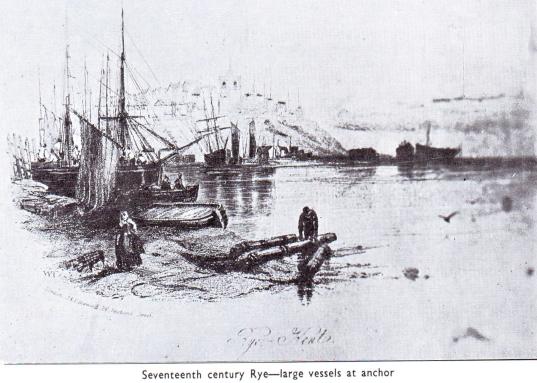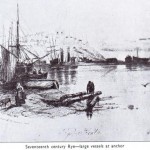A Summary History Of Rye
Part Ill—The Seventeenth Century
by Rya
Rye, at the opening of the seventeenth century, still boasted an almost intact town wall, except on the eastern side: the battery in the Gungarden still possessed some guns, although the majority had been sent away at the time of the Armada. The harbour, on which the prosperity of the town so much depended, continued to deteriorate and was, consequently, a constant source of anxiety to the corporation. Although no foreign invader was to set foot in the town again all was not well, for the monarchy was on the verge of bankruptcy. “Though God hath raised me high”, the members in the Council Chamber in Whitehall heard Elizabeth say, “yet this I count the glory of my crown, that I have resigned with your loves . . . And though you have had, and may have, many mightier and wiser prices . . . yet you never had, nor shall have, any that will love you better”. It was in such fine phrases that the last of the Tudors wrote her epitaph. Two years later in 1603 Gloriana passed away.
Many were the changes that took place in the new century. In 1603 the new Mayor was not elected at the Old Cross in the churchyard in accordance with the custom, but at the Guildhall. The custom, which had prevailed since 1289, was never revived. The Lord Warden began to interfere with the free election of the town’s two members of Parliament, who had—since the thirteenth century— been the leading inhabitants of the town. In 1620 both the Lord Warden’s nominees were returned without protest. Several inhabitants settled in America in this period and there founded two villages, Rye and Hastings. The building in which the old grammar school was housed, was built for Peacock in 1636 and founded as a “free school in Rye for the better education and breeding of youth in good literature”. It was this school that Thackeray’s Dennis Duval attended and therein “learned to speak English like a Briton-born as I am . . . I got a little smattering of Latin too, and plenty of fighting for the first month or two.” In 1720 another free school was established—Saunders—for instructing “the poor children to read English and write, and cast accounts, and to teach and instruct them in the art of Navigation gratis.
In 1642 the Civil War broke out and, although it is difficult to gauge its exact effect on Rye, it would seem that she had strong puritan leanings, a fact borne out, perhaps, by the Rye Engagement of 1650 which had to be signed by each person holding any judicial position or office of trust that they would be true and faithful to the Commonwealth. Out of the 168 signatories, 77 merely made their mark. In 1651 Samuel Jeake I was appointed town clerk. A much neglected figure, he can without hesitation be described as the greatest son of Rye. A meticulous and prolific worker, he was an astrologer, mathematician, lawyer and the first historian of the Cinque Ports and Rye.
seventeenth century Rye—large vessels at anchor
It is not without interest that during this period there was a great shortage of small change. To remedy this, the tradesmen of Rye issued tokens of their own. In 1652 William Key, the landlord of the Ship Inn, issued a farthing token with a ship on one side and the initials of his wife and himself on the reverse. Michael Cadman of the Mermaid and Thomas Boyce, a grocer, did likewise. The practice did not cease with Restoration for in 1668, the Corporation issued a large number of farthing tokens. In 1672 a new regal farthing was issued and all the tokens were ordered to be redeemed.
Rye made some progress in the century in spite of her economic difficulties. The Gun Garden was turned into a bowling green and leaden pipes were laid from the wells to the Conduit head. As a result of Louis XIV’s fresh persecutions and the Revocation of the Edict of Nantes in 1685, a large number of Huguenots settled in Rye. Many of their descendants still live in Rye and district, such as the Reynolds, Lewns, Meryons, Gassons and Paines. On the other hand, the town’s rentals had greatly diminished in value and Tenterden’s composition was nearly always overdue.
When the French fleet, that had taken James II to Ireland, appeared in Rye Bay, Samuel Jeake II recorded its effect. “In the morning, about six, a terrible alarm in the town of Rye; of the French coming to land. . . Upon this an intolerable hurry all day… I sent my mother-in-law and daughter out of the town. . . and with them my writings and gold, the rest of my money I sent afterwards and my wife’s clothes in the evening.” The landing never materialised, the French merely firing a few balls at Hastings.
From the April 1966 Issue of “Rye’s Own”
All articles, photographs, films and drawings on this web site are World Copyright Protected. No reproduction for publication without prior arrangement. © World Copyright 2016

